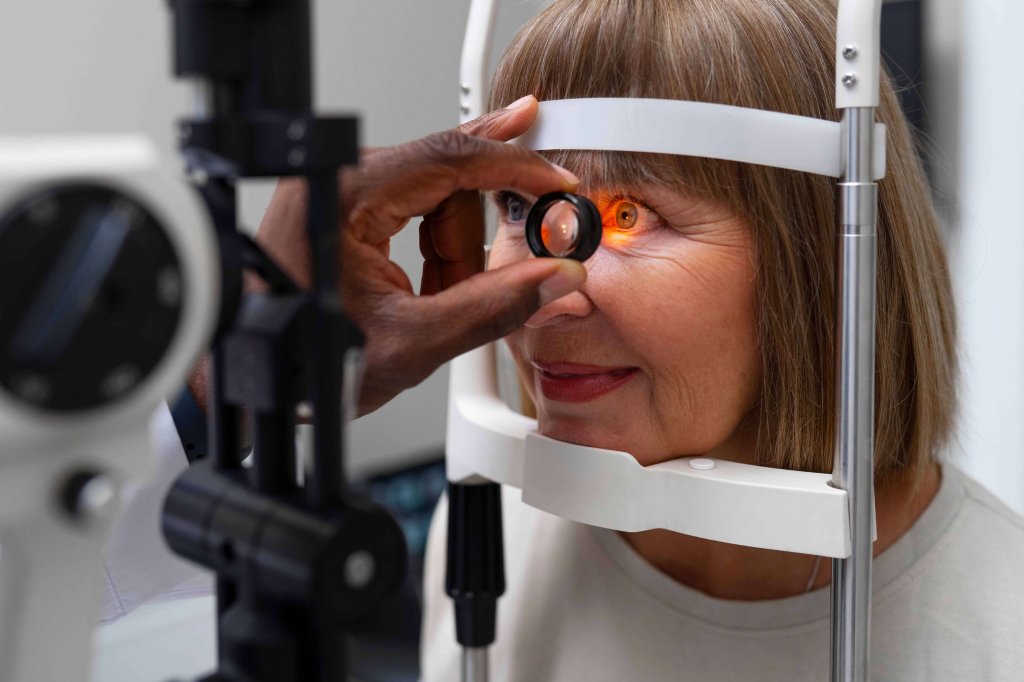What is Cataract?
Definition of Cataract and Its Impact on Eye Health
Cataract is an eye condition characterized by the clouding of the eye lens. This clouding can lead to vision loss and serious visual impairments. Cataracts typically develop as a result of aging, but factors such as trauma, diabetes, and genetic predisposition can also play a role.
Prevalence of Cataracts and Who is Affected
Cataract is one of the most common eye diseases worldwide and is usually seen in individuals over 60 years of age. However, it can also occur at younger ages. The prevalence of cataracts increases with age, affecting a significant portion of the elderly population.
Symptoms of Cataracts
Early Symptoms of Cataracts: Blurred Vision, Color Fading, and More
Early symptoms of cataracts include blurred vision, faded colors, sensitivity to light, and difficulty with night vision. Patients may often experience double vision or a sensation of having a film over their eyes. These symptoms can hinder daily activities and reduce quality of life.
Advanced Symptoms and Their Impact on Eye Health
As cataracts progress, symptoms become more pronounced, and vision loss can become more severe. In advanced stages, cataracts can cause complete clouding of the eye, making it difficult for individuals to distinguish light and shadows. This condition may reach a point where surgical intervention is necessary.
Causes of Cataracts
Relationship Between Aging and Cataracts
The most common cause of cataracts is aging. As people age, the eye lens naturally loses its flexibility, and changes occur in its protein structure. These changes lead to clouding of the lens and the formation of cataracts.
Other Risk Factors: Diabetes, Genetic Factors, Trauma, and More
In addition to aging, diabetes, eye injuries, prolonged exposure to UV rays, smoking, and certain genetic factors increase the risk of cataracts. Individuals with diabetes may experience faster progression of cataracts. Additionally, eye injuries and certain medications can contribute to cataract formation.
Cataract Surgery
What is Cataract Surgery and How is it Performed?
Cataract surgery involves removing the cloudy lens and replacing it with an artificial intraocular lens (IOL). The most common surgical technique is known as phacoemulsification, which uses ultrasound waves to break up and remove the lens. A new lens is then implanted.
Phacoemulsification and Other Surgical Techniques
Phacoemulsification is a minimally invasive technique that allows for rapid recovery. Other surgical techniques include manual small incision cataract surgery (MSICS) and extracapsular cataract extraction (ECCE). The choice of technique depends on the patient's condition and the surgeon's preference.
Cost of Cataract Surgery
Comparison of Costs Between Private and Public Hospitals
The cost of cataract surgery varies depending on the type of hospital and surgical technique used. Prices are generally higher in private hospitals, but they may offer shorter waiting times and advanced technology. Public hospitals are typically more affordable, but waiting times may be longer.
Insurance Coverage and Additional Expenses
Many insurance companies partially or fully cover cataract surgery costs. However, it's important to inquire about insurance coverage and additional expenses such as post-operative check-ups, eye drops, and special lenses.
Post-Cataract Surgery
Recovery Process and Expectations
The recovery process after cataract surgery is usually fast. Patients can typically return to normal activities within a few days, but complete recovery may take a few weeks. It's important to use eye drops regularly and attend doctor's appointments as recommended during this period.
Eye Care and Doctor's Check-Ups
During the post-operative period, certain measures should be taken to protect the eyes and reduce the risk of infection. Regular use of eye drops and adherence to doctor-recommended check-ups are crucial. Avoiding rubbing the eyes and heavy exercise is also important.
Duration of Cataract Surgery
Surgery Time and Preparation Stages
Cataract surgery typically lasts 15-30 minutes. Pre-operative preparation stages may take about an hour, including numbing the eye and cleaning it with antiseptic solutions.
Step-by-Step Operation Time
Numbing the Eye: Local anesthesia is applied.
Incision: A small incision is made on the cornea.
Lens Fragmentation and Removal: The lens is broken up and removed using ultrasound waves.
Placement of New Lens: An artificial lens is implanted.
Closing the Incision: Stitches are usually not required.
Post-Cataract Surgery Issues
Possible Complications and Coping Strategies
Cataract surgery is generally a safe procedure, but some complications may occur. These complications include eye infections, lens displacement, increased intraocular pressure, and retinal damage. Regular doctor check-ups are important for managing these conditions.
Eye Infections, Lens Displacement, and Other Risks
Eye infections are among the most serious complications after surgery. Symptoms include redness, pain, and vision loss. Lens displacement refers to the lens being out of the correct position, which may require a second surgery. Increased intraocular pressure can increase the risk of glaucoma.
Risks of Cataract Surgery
Potential Dangers of Surgical Intervention
Cataract surgery carries some risks, including infection, bleeding, retinal detachment, lens capsule rupture, and vision loss. However, modern surgical techniques and sterilization procedures minimize these risks.
Success Rate of Surgery and Risk Management
Cataract surgery has a high success rate, exceeding 95% with experienced surgeons and appropriate surgical techniques. To manage risks, it's important to follow pre-operative and post-operative doctor recommendations.
Non-Surgical Treatment for Cataracts
Natural and Alternative Treatment Methods
While non-surgical treatment for cataracts is not possible, some natural and alternative treatments may slow its progression. These methods include dietary changes, vitamin supplements, and eye drops.
Eye Drops, Dietary Changes, and Vitamin Supplements
Certain eye drops may slow the progression of cataracts. A diet rich in antioxidants plays a crucial role in maintaining eye health. Vitamins such as C, E, and beta-carotene are beneficial for eye health and may reduce the risk of cataracts.
Frequently Asked Questions
Does cataract surgery cause pain?
Cataract surgery is performed under local anesthesia, so patients do not feel pain during the procedure. Mild discomfort and itching may be experienced after surgery, but this is usually temporary.
When can I return to my normal activities after cataract surgery?
Patients can typically return to normal activities within a few days after cataract surgery. However, complete recovery may take a few weeks. It's important to follow your doctor's recommendations.
Can cataract surgery be done on both eyes at the same time?
Cataract surgery is usually performed separately for each eye. The second eye surgery is scheduled after the first eye has healed. This approach ensures a healthier recovery for both eyes.
Will I need glasses after cataract surgery?
Some patients may continue to need glasses after cataract surgery. Depending on the type of intraocular lens implanted during surgery, glasses may be required for distance or near vision. Multifocal or toric lenses can reduce the need for glasses.
Is cataract surgery safe?
Cataract surgery is a highly safe procedure thanks to modern medical technology and surgical techniques. The risk of complications is low, and the success rate of the surgery is high.
To learn more about cataracts and protect your eye health, consulting with your doctor is important. Remember, early diagnosis and treatment play a vital role in preventing vision loss.
This content is for informational purposes only and provides general information about health topics. The information provided here should not be used for the purpose of evaluating your individual medical condition or providing treatment recommendations by a healthcare professional. If you have any concerns or symptoms related to your health, please consult a healthcare professional before applying any treatment or management strategies on your own.




